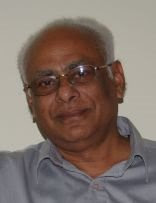Once upon a time (long ago) Bangalore used to be known as pensioners' paradise. When I first arrived in Bangalore in the early 70s it was a city of tree-lined roads, leisurely drives, clean air and inexpensive restaurants. Flyovers, one-way streets and underpasses were unknown. These days the former pensioners' paradise has changed its name to Bengaluru. With a concentration of information technology companies it is known world over as 'the Silicon Valley of India' . Along with information technology came a host of problems: congestion, pollution and chaotic traffic, to name a few.
Infrastructure development never kept pace with Bengaluru's rapid IT development. Endemic corruption acts as the perennial spoke in the wheels of progress. This is particularly evident on the roads. Driving in Bengaluru has become a nightmare so much so people are socializing less and less. What I do to amuse myself, sitting in never-ending traffic jams, is to observe and smile at the strange behaviors unique to India. Here is a sample.
· Arrival/Departure of a so-called VIP (Very Injurious Parasite, according to Jug Suraiya) forces all motorists to be stranded in the middle of nowhere until 'his majesty's' motorcade passes. No one is bothered about the man-hours lost or the sick that need urgent medical care. (We may be a democracy in name, but in practice we are still feudalistic in our attitude!)
· Motor-cyclists overtaking on the left in defiance of your left indicator flashing. When he is knocked down, you are the guilty party!
· Autos cruising looking for passengers. Imagine you are stuck behind with a running tummy!
· Those driving straight keeping to the extreme left at a traffic junction blocking traffic from using the free left.
· Vehicles (autos in particular) keeping to the extreme left and then trying to make a U-turn at a junction while the traffic is moving forward.
· Parking almost in the center of the road and going about your business, as though this person has inherited the road.
· Cyclist on the extreme right in the fast lane (as understood internationally). He needs almost the entire lane as he swings his hips from side to side.
· Ditto for bullock/horse carts minus the swagger.
· Ditto for fruit vendors; in addition they are always crossing the road as though the fruits are sold faster on the other side.
· Drivers on a two-way street, while turning to the right onto a one-way street, cutting corners preventing the smooth flow of oncoming traffic.
· Vehicles, particularly autos and motor-cyclists, coming and stopping more and more to the right of a narrow two-way street at a traffic light to a main road, blocking those from the main road from turning left.
· Government vehicle parking smack below the 'no parking' sign on the right of narrow one way street (parting is allowed on the left) and the madam/sir coolly going about his business, while ordinary mortals have to go round this VIP car.
· Cows/buffalos helping to create traffic circles.
· Jumping traffic lights.
There was an interesting article titled "Short Arm Of The Law" by Ronojoy Sen in The Times Of India dated February28, 2008. In it the question 'Why do Indians jump traffic lights?' is asked. The answer according to Sen is that there is no rule of law in India. The citizen easily flouts the law because the enforcing agencies are ineffective. Endemic corruption, lack of equipment and insufficient personnel are flaunted as the usual culprits. But what should worry one more is the attitude of the common man towards law. One reason for breaking the law with impunity is the low cost of doing so. Sen goes on to say that many law-abiding people wish for another dose of Indira Gandhi's emergency rule or some kind of dictatorship so that the stick can be wielded ruthlessly and force people to fall in line.
This means that the average Indian only responds to 'fear' - fear of punishment whether human or divine. He will not urinate against the compound wall if the picture of a god/goddess is painted thereon; not because his action will cause health problems. He will not follow traffic rules out of civic duty. The same is true in most areas of life. A minister can steal crores but nothing will happen to him if his party is needed to prop up the government. Add to this the feudalistic mentality of the Indian. The spectacle of senior IAS offices feeding cake to CM Mayawathi and MLAs prostrating before Jayalalitha come to mind. The question to ask is: are we Indians truly free? Are our minds free of oppression? What kind of education are we are imparting to our children in India, if at the end of the day when they become IAS officials and MLAs they are so servile and act so slavishly? [Do you think I am in Utopia?]

No comments:
Post a Comment